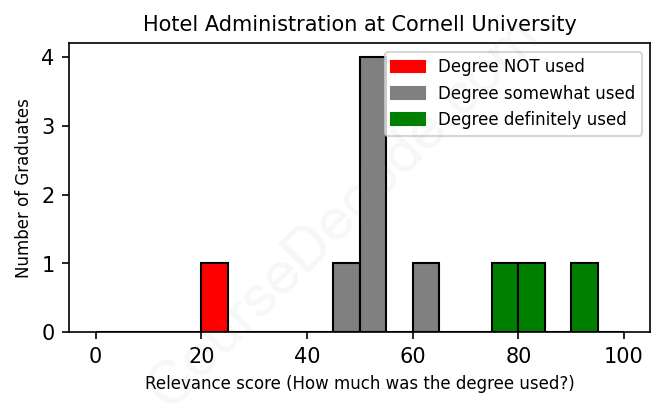
First, some facts. Of the Hotel Administration graduates from Cornell University we've analyzed , here's how many have used (or NOT used) their degree in their career:

These are estimates based on AI analysis of 10 LinkedIn profiles (see below).
The verdict? Below average. Overall, with an average relevance score of 57%, Hotel Administration graduates from Cornell University have a lower likelihood (-10%) of finding work in this field compared to the average graduate across all fields:
And for comparison, here's the chart for all profiles we've looked at across all degrees.
Also, after graduating, only 10% of these graduates have pursued further education other than another Bachelor's degree (such as a Masters degree or other), compared to the average across all profiles of 35%. This suggests a Bachelors degree is enough for most Hotel Administration graduates, and it's normal to look for work straight after graduation.
See the details:
|
Relevance score: 50% We think this person has gone into a career only somewhat relevant to their degree. We think this person has gone into a career only somewhat relevant to their degree.
DEGREE INFOGraduated in 2012 from Cornell University with a Bachelor of Science (B.S.) in Hotel Administration. No other secondary education since. JOB HISTORY SINCE GRADUATIONDirector Trinity Investments Aug 2023 - Present ABOUTNo information provided. |
The top 10 most common jobs done by the graduates we've analyzed (ranked most common to least) are:
Here is a visual representation of the most common words in job titles for Hotel Administration graduates (this is across all Hotel Administration graduates we've analyzed, not just those who went to Cornell University):

From analyzing the LinkedIn profiles of recent Cornell University Hotel Administration graduates, it seems like they have generally pursued careers within the hospitality and business sectors. Right after graduation, many of them land roles that are pretty hands-on and directly related to hotel management, such as cooks or event managers. For instance, the 2011 graduate started as a Special Events Cook and worked his way up to owning a restaurant. This suggests that many graduates take on entry-level positions in the hotel and restaurant industries, gaining valuable experience, which is super important in this field.
Looking five to ten years down the line, there’s a noticeable shift where some graduates transition into higher-level positions, often moving into management roles or even shifting into related fields like finance and marketing. For instance, the 2013 graduate went from a Senior Analyst at Goldman Sachs to co-founding a company. This adaptability shows that a degree in Hotel Administration gives graduates a strong skill set that’s transferable across various industries. Others, like the 2018 graduate, stayed within the hospitality sector, climbing the ranks at Marriott. Overall, it appears that many Cornell Hotel Administration graduates are doing well, carving out successful careers that align with their education, while also exploring a variety of paths within and outside the realm of hospitality.
Getting a Bachelor’s degree in Hotel Administration at Cornell can definitely be challenging, but it's not impossible! The program is pretty rigorous, packed with a mix of core business classes and specialized hospitality courses, so you’ll need to be ready to put in some serious study time. Plus, there’s a lot of hands-on learning and group projects, which can be a bit hectic. That said, if you have a passion for hospitality and are willing to engage with the material and your classmates, it can be really rewarding. Overall, it's a demanding degree, but with the right mindset, plenty of students have a great time and make it through!
Most commonly, in the LinkedIn profiles we've looked at, it takes people 4 years to finish a Bachelor degree in Hotel Administration.
Looking at the career paths of these Cornell Hotel Administration grads, it seems like there’s a pretty good mix in terms of earning potential. The ones who ventured into high-level positions, like the graduate who became a Director at Trinity Investments or the Senior Analyst at Goldman Sachs, likely raked in some serious cash right after graduation. On the flip side, those who started as cooks or in entry-level restaurant roles probably didn’t see paychecks that show off that Ivy League diploma immediately. As you look further down the line, many transitioned into managerial or director-level positions, which definitely boosts their earning potential. Overall, while not every entry-level job was a money-maker, it seems like they climbed the ladder quite effectively, suggesting that many of them are doing pretty well financially now!
Here is a visual representation of the most common words seen in the "about" section of LinkedIn profiles who have a Bachelor degree in Hotel Administration (this is across all Hotel Administration graduates we've analyzed, not just those who went to Cornell University). This may or may not be useful:

Here are all colleges offering a Bachelor degree in Hotel Administration (ordered by the average relevance score of their Hotel Administration graduates, best to worst) where we have analyzed at least 10 of their graduates:
| College | Score | Count |
|---|---|---|
 Cornell University Cornell University
|
57 | 10 |